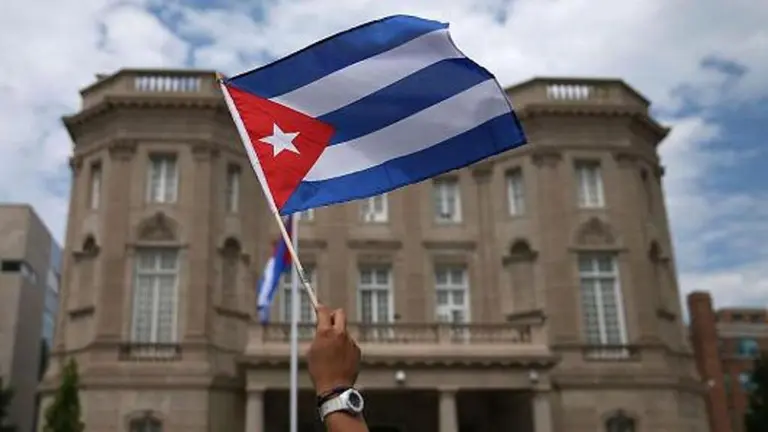Imagen Getty Images
Cuban embassy, Washington DC
Barely two years after the United States and Cuba formally resumed diplomatic relations, they appear to be returning to Cold War times.
On Tuesday the U.S. State Department expelled more than half of Cuba’s diplomatic an embassy staff in Washington, giving Havana seven days to remove 15 diplomats.
It was latest U.S. response to mysterious “sonic attacks” on diplomats in Cuba that have affected at least 22 Americans, in some cases with serious health effects on their hearing, balance and vision.
Last week, in another unilateral U.S. move, the Trump administration announced a similar 50 percent cut its own embassy staff in Havana, suspending visa processing for Cubans. Both embassies are now left effectively running emergency services only.
Cuba’s foreign ministry protested the expulsion calling it “unfounded and unacceptable,” denying it had not done enough to prevent “the alleged incidents,” insinuating that the attacks may not be real.
Cuba also complained that the U.S. had failed to provide sufficient information to identify “potential perpetrators, in case there were any.”
U.S. officials said the goal wasn’t to punish the communist-run island, but to ensure both countries have an “equitable” number of diplomats in each other’s capitals. On Tuesday, a senior State Department official told reporters the latest move “does not signal a change of policy” towards Cuba, not does it “presume culpability” on Cuba’s part.
Diplomatic relations with the communist-run island would be maintained, the official said.
The official added that the U.S. had come to the conclusion that the frequency of the sonic attacks represented a “consistent pattern” targeting U.S. diplomats. Staffing levels would stay on a reduced footing until Cuba could could assure “the safety, security and wellbeing” of U.S. staff in Cuba, the official said.
Sen. Marco Rubio, a Florida Republican, applauded the administration’s newest step, saying in a Twitter post that the move to expel two-thirds of “Castro regime employees” from the Cuban Embassy in Washington “was the right decision.”
The U.S. has also shifted its wording in recent days, now saying its diplomats had been hit by deliberate sonic “attacks” and not merely the victim of unexplained “incidents,” as they were previously refered to.
Until now, officials in both countries have spent weeks apparently seeking to minimize the damage to relations, amidst widespread suspicion that the attacks could be part of a sinister plot to drive a wedge in the newly restored relations, perhaps from a U.S. enemy, such as Russia, Iran or North Korea.
Some Cuba experts have speculated that the attacks could be the work of “dark” political forces within Cuba’s large and highly skilled security forces, determiend to sabotaged the warming of relations begun by President Barack Obama.
When asked if that was a possibilty, a senior U.S. official declined to comment, referring Univision to official statement by U.S. Secretary of State, Rex Tillerson, after he met Sept 26 with Cuba’s foreign minister, Bruno Rodriguez.
“Investigators have been unable to determine who is responsible or what is causing these attacks,” Tillerson said in a statement. “Cuba has told us it will continue to investigate these attacks and we will continue to cooperate with them in this effort,” he added.
On Monday, The Associated Press reported that U.S. spies were among the first and most severely affected victims. Though bona fide diplomats have also been affected, it wasn’t until intelligence operatives, working under diplomatic cover, reported bizarre sounds and even stranger physical effects that the United States realized something was wrong, several individuals familiar with the situation said.
The mysterious “health attacks” started within days of President Donald Trump’s election in November, the AP has reported. But it wasn’t until last Friday that the United States ordered more than half its embassy staff to return home.
Delivering a one-two punch to U.S.-Cuba relations, the U.S. last week also delivered a travel warning to Americans to stay away from Cuba, a move that could have profound implications for the island’s travel industry.
The U.S. said that since some workers had been attacked in Havana hotels, it couldn’t assure Americans who visit Cuba that they wouldn’t suffer attacks.
Several U.S. lawmakers had complained that last week’s move by Washington didn’t go far enough, because President Raul Castro’s government was being permitted to keep all of its diplomats in America. Sen. Marco Rubio, R-Fla., had called the one-sided action “an insult” in an AP interview.
Ultimately, the U.S. decided to take reciprocal action, too, bringing the two countries yet closer to the chilly state of relations they endured for decades until 2015, when they restored formal ties and re-opened embassies in Havana and Washington.
The U.S. previously had roughly 50 American workers at its embassy in Havana, and the reduction will bring the figure down to roughly 20.
To medical investigators’ dismay, symptoms have varied widely. In addition to hearing loss and concussions, some people have experienced nausea, headaches and ear-ringing. The Associated Press has reported that some now suffer from problems with concentration and common word recall.
The incidents stopped for a time. They recurred as recently as late August, officials say.
Information from the Associated Press was used in this article
Source link : http://www.bing.com/news/apiclick.aspx?ref=FexRss&aid=&tid=66b5a1ba45404bf58ce2c9be4da60c97&url=https%3A%2F%2Fwww.televisa.com%2Fcanal5%2Funivision-news%2Flatin-america%2Fus-expels-half-cubas-diplomats-over-sonic-attacks&c=14992258314429757728&mkt=en-us
Author :
Publish date : 2024-08-08 17:52:00
Copyright for syndicated content belongs to the linked Source.
